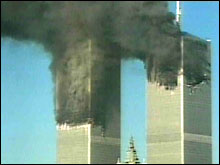|
Sept. 11, the only story
|
 |
December 17, 2001: 2:34 p.m. ET
The terrorist attacks will cost Wall Street and corporate America hundreds of billions of dollars.
By Martine Costello
|
NEW YORK (CNN/Money) - When the first plane slammed into the north tower of the World Trade Center Sept. 11, the sales staff at Network Plus didn't have time to be heroes.
They were on the 81st floor as a thunderous crash enveloped them. The building swayed, every joint moaning. Elevators exploded in flames. Walls caved in, and gaping holes appeared in the floors.
But amid the frenzy, one salesman stopped to kick down the ladies room door to free three women trapped inside. Two others stopped on the 68th floor to carry a woman in a wheelchair to safety. A fourth stayed behind to help escort the frail and elderly, and had to climb out of the rubble after the collapse.

|
|
|
The sales staff at Network Plus worked to save others after the attacks. | |
That scrappy spirit helped the phone company rebound from the nation's worst terrorist attack, and it also helped it succeed amid a "telecom nuclear winter," said founder and president Rob Hale.
"The tenacity they showed on Sept. 11 is woven through the fabric of our company," he said.
Network Plus was one of hundreds of companies displaced when the Trade Center came down, and one of thousands more to suffer economic damage.
Like an earthquake -- or perhaps a nuclear blast -- Sept. 11 shook the foundations of both Wall Street and corporate America, eclipsing any other story of 2001. Who remembers hanging chads and Gary Condit?
The only story of the year
Sept. 11 seeped into our consciousness one terrible fact at a time. It brought the $10 trillion U.S. economy to a halt. And air traffic was grounded for the first time in history.
It's not yet known how much the tragedy will ultimately cost, but the price tag in September alone from the loss of property, income and jobs was at least $60 billion. The final number will easily be in the hundreds of billions of dollars.
The attacks also lowered third-quarter gross domestic product by as much as 2.5 percentage points, giving the economy its worst performance in a decade and pushing it deeper into recession. Unemployment jumped to its highest rate in six years as companies cut nearly 625,000 jobs.
"Without the terrorist attacks, we would be experiencing economic recovery in this quarter," said Sung Won Sohn, chief economic officer at Wells Fargo Bank.
Terrorism takes its toll on Wall Street
On Wall Street, the reaction was swift and severe. Markets closed for four days following the attacks, the longest shutdown since the Great Depression. When trading resumed the following Monday, U.S. stocks plunged to their lowest levels in nearly three years. The Dow Jones industrial average hemorrhaged 684 points, or about 7 percent, while the Nasdaq composite index fell 6.8 percent to 1,579.55.
Individual investors ran for the exits those first few weeks, selling across the board. Net outflows to equity mutual funds reached $29.5 billion, the largest cash-out in the history of the industry, according to the Investment Company Institute. Investors also moved $12.65 billion out of stock funds and into the relative safety of fixed-income, or bonds, in September, triple the level of transfers in the previous month.
"Many retail investors were in panic mode, however many of them slowly began to come back to the marketplace as the cloud of uncertainty began to lift," said Peter Cardillo, chief market strategist at Global Partner Securities.
As the months wore on, successful missions in the war on terrorism sparked a powerful rally, sending the Dow up 17.5 percent and the Nasdaq up 36.8 percent since Sept. 21. "A lot of people think wars lead to pessimism and gloom and doom. But the stock market has usually rallied," said Dick McCabe, chief market analyst at Merrill Lynch. The Federal Reserve's 11 interest rate cuts also helped.
Net flows to funds in October turned positive, ending up $758 million, while exchanges out of stock funds dropped to $2.48 billion. "The rally was pretty much across the board," Cardillo said.
Not all sectors shared in the rebound, however. Airlines, which slashed their routes by 20 to 25 percent, suffered devastating blows due to weakened demand. Many were on the brink of insolvency until Congress approved $5 billion in federal aid. Retailers, too, have lost at least $5 billion in sales and insurers have paid out roughly $25 billion in claims to date. Analysts estimate claims costs could climb to as much as $50 billion or $60 billion.
"We've never seen anything like this hit insurance companies," said Howard Carver, an insurance expert and managing partner at Ernst & Young. Even in Hurricane Andrew in Florida, considered one of the worst U.S. disasters before Sept. 11, claims only reached about $25 billion.
Meanwhile, hotel occupancy rates dropped from about 80 percent in early September to about 30 percent in December.
"It's bad. Everyone wants to talk about how it's getting better, but we're stuck here at a pretty lousy level," said Michael Rietbrock, a hotel and leisure analyst at Salomon Smith Barney.
And in the technology sector, the estimate for IT spending in 2001 dropped from 5 percent in the plus column before Sept. 11 to a decline of 2 percent thereafter, said Stephen Minton, a tech analyst at research firm International Data Corp.
Click here to see some images of Wall Street
Most of the impact on the S&P 500 in the third quarter stems from insurance companies, said analyst Chuck Hill. First Call expected an earnings loss of 17 percent in the quarter; after Sept. 11, that number changed to a loss of 21.6 percent.
America limped into October and November, wiping away tears and counting its dead. Patriotism was on display as old Glory appeared on bookbags, car windows and people's lapels.
The nation was paralyzed by the still-smoking pit of mangled steel at Ground Zero. A glimpse, for many, of what hell might look like.
"The best way I can describe America is we're sleep-walking through Christmas," said Brit Beemer, president of America's Research Group, which tracks consumer activity.
Consumers are looking for comfort, shopping on a budget at stores like Wal-Mart, and if they do splurge they're spending only half as much. They'll be done with Christmas shopping by Dec. 15, something Beemer hasn't seen in 20 years of research. Why? They'd rather be home with their families.
But some fears have subsided. Linda Sheffy, sales manager at Micro Contamination Control in Denver, said the company sold only about 100 gas masks to people worried about biological terrorism. "There were a lot of inquiries right away, because there was a fear that maybe America wasn't what it used to be. But the fear was short-lived."
Of course, life will never really return to normal. That terrible day, Sept. 11, will stay with Americans forever. 
Click here to send mail to Martine Costello
|
|
|
|
|
|

|

